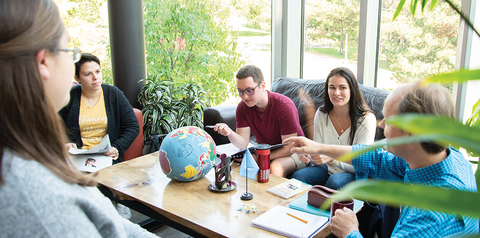
Peace and Conflict Studies (PACS) is an interdisciplinary undergraduate program that allows you to explore conflict and injustice, and discover ways to promote peace that fit your interests and goals.
Canada's longest-standing Peace and Conflict Studies program, you will engage with unconventional, nonviolent ways to transform conflict and pursue restorative justice and sustainable social change. Find out how peace is built in complicated situations around the world and locally by connecting theory and practice. Learn from leading faculty and practitioners. Combine peace scholarship and skills development with co-op placements or internships.
PACS Mission Statement
Within the parameters of the mission of Conrad Grebel University College, the PACS mission states: "In a manner consistent with Mennonite Anabaptist beliefs, the mission of PACS is to educate students to pursue peace and justice in the context of diverse investigations into the origins and nature of conflict and violence. The program strives to educate, invigorate, and mobilize students to use conceptual and/or practical models to imagine and build a culture of peace between individuals, in our communities, among nations, and around the world."
First-year courses
A Peace and Conflict Studies major can be done as Honours Arts or Honours Arts and Business by completing 16 required courses, or as a Minor by completing eight (8) required courses. During your first year, you will take a mix of foundational Peace and Conflict Studies courses including PACS 101,PACS 201, PACS 202, and PACS 203 alongside other Arts First Courses (i.e. Arts 130, Arts 140).
In your upper years, most of the classes you will take will be PACS and PACS-approved courses.
Learn more about the courses you'll take for your PACS degree →
How big are PACS classes?
In your first year, Peace and Conflict Studies (PACS) classes have between 50 and 120 students. Once you get into your second year and beyond, our classes have around 15-40 students. This means that you can get to know other PACS students, have engaging discussions on course content, and build closer relationships with your professors than may be possible in larger arts programs.
Program Learning Objectives
It is expected that by the completion of a PACS degree, students should be able to:
- Support the development of entrepreneurial peace and social change agents.
- Analyze the peace and conflict aspects of relationships, systems, and structures.
- Apply peace theory to interpersonal, inter-group, and international relationships.
- Explore individual philosophical, ethical, or spiritual motivations for engagement as responsible citizens and agents of change.
- Understand the potential that all key actors in society have to contribute toward building a culture of peace and justice in the world.
- Identify approaches and methodologies that shape and influence just and peaceful responses to conflict.
- Promote an ethic of engagement in peace and conflict issues.
- Engage conflict in ways that mitigate destructive dynamics and maximize the potential for creative, just, and peaceful social change.
- Effectively carry out practice-oriented research into issues of peace.
- Demonstrate a theoretical and practical understanding of the holistic nature of a culture of peace.
What can I do with a PACS degree?
The interdisciplinary nature of a degree in Peace and Conflict Studies is dynamic and innovative and opens many doors for graduates. Some areas PACS alumni are working in include: Program Coordination with Non-governmental Organizations (NGOs), Public Policy Research, Law, Community Development, International Development, Refugee Resettlement Support, and Community Mediation.
Find out more about What Our Graduates Do →